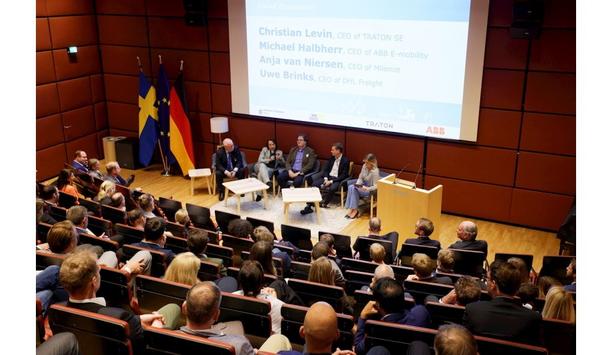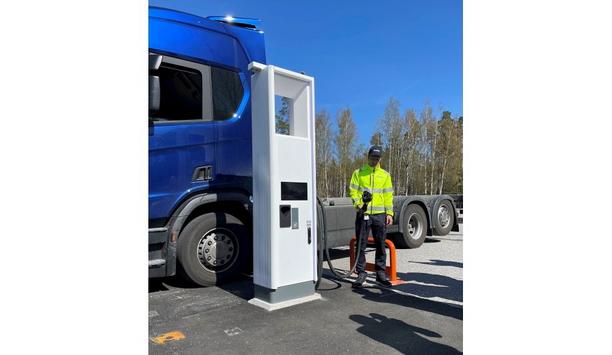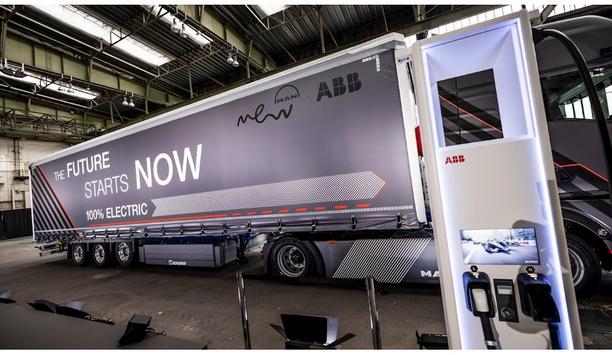Traton Group - Experts & Thought Leaders
Latest Traton Group news & announcements
Against the backdrop of the Swedish EU Presidency and in the presence of German Transport Minister, Volker Wissing and the Swedish Transport Minister, Andreas Carlson, ABB E-mobility, TRATON, DHL Freight and Milence jointly discussed the progress and challenges in the electrification of long-distance commercial vehicles at the Swedish Embassy in Berlin. While the electrification for middle and last mile logistics is gaining greater traction, electric heavy-duty long-distance transport is still in its infancy. Megawatt charging represents an opportunity for more widespread adoption of sustainable transport solutions for long haul commercial vehicles. Sustainable transport future for heavy duty vehicles Key industry stakeholders are working collaboratively to pave the way for a sustainable transport future" Michael Halbherr, the interim Chief Executive Officer (CEO) of ABB E-mobility explained: “The electric truck market is still nascent but the technology is there and significant progress is already being made. Key industry stakeholders are working collaboratively to pave the way for a sustainable transport future for heavy duty vehicles.” He adds, “Firstly, by working on key technologies such as megawatt charging and digital charging management solutions, and secondly, by providing and optimizing solutions for the special requirements of long-distance transport like power density, greater grid capacity, microgrid integration and the demands of tough driving schedules." Technology for transition to sustainable transportation Michael Halbherr continues, “At ABB E-mobility, we are drawing on our experience in developing world-renowned EV charging solutions alongside key stakeholders across the sector to enable the needed progress, and continue to encourage support from policymakers across Europe.” From a vehicle perspective, Christian Levin, CEO TRATON stated: “The technology for the transition to sustainable transportation is ready — for trucks and buses and for charging stations. The TRATON GROUP brands have already proved that their battery electric vehicles are suitable for everyday use and can withstand even the harshest of conditions.” Megawatt Charging System (MCS) Christian Levin continues, “Battery technology has advanced so much that a truck can now cover more than 1.5 million kilometers — in other words its entire lifespan — without needing to replace its battery. With the Megawatt Charging System (MCS), another crucial component of battery technology is also up and ready to go.” Christian Levin adds, “We now need policymakers to act quickly and give us their widespread support so that we can build a high-performance European charging network at the required speed. This would then pave the way for the European Union to reach its climate goals.” First successful charging session The past twelve months show the huge steps leading companies and institutions of the industry, among these, ABB E-mobility and TRATON, have achieved with regards to MCS. Together, they have already developed a first draft of the MCS standard. ABB E-mobility announced a pilot megawatt charging system had been successfully installed in Sweden Only few days ago, together with Scania, a brand of TRATON, ABB E-mobility announced a pilot megawatt charging system had been successfully installed and tested in Sweden. Although the charging power is not yet in the megawatt range, the initial testing, to prove the technical feasibility of the system and connector, and allowing first software communication between charger and vehicle, is considered the next milestone in the development of an efficient, high power charging solution for heavy duty vehicles. Progressive deployment of high-power chargers With the progressive deployment of high-power chargers, with a final target current of 3000 A, the technology will enable half the charging time for heavy duty vehicles compared to charging solutions available today. In addition to megawatt charging, the existing CCS standard will also play a key role. To ensure the seamless operation of electric fleets, in addition to charging solutions installed at depots, it is crucial to have sufficient charging points available along highways, where charging during breaks and overnight charging with lower power is possible. To achieve this, grid expansion, the supply of renewable energy and digital charging management solutions must be driven forward at pace. Setting the electrification agenda Policymakers must set the course so that electro-mobility can work efficiently for long-distance transport As the panelists at the Swedish Embassy discussed, expertise and innovation from industry stakeholders alone will not be enough. Instead, policymakers must set the course so that electro-mobility can work efficiently for long-distance transport. More speed in planning and approval procedures, as well as harmonization of the respective requirements in building laws of the federal states are crucial for rapid ramp-up. The panelists also agreed that the industry needs clear signals from policymakers, in order to build confidence among EU wide logistics companies and EU member states who have yet to embrace the benefits which e-mobility solutions for heavy duty trucking can deliver. Alternative Fuels Infrastructure Regulation (AFIR) The Alternative Fuels Infrastructure Regulation (AFIR) is a good step in this direction as well as EU funded projects like ZEFES (Zero Emissions flexible vehicle platforms with modular powertrains serving the long-haul Freight Eco System), which brings together various players from industry and research, to test a variety of heavy-duty long-distance vehicle concepts. ABB E-mobility is enabling zero-emission mobility as a global leader in electric vehicle (EV) charging solutions for a more sustainable and resource-efficient future. They are a partner of choice for the world’s biggest EV OEMs and nationwide EV charging network operators, offering the widest portfolio of EV charging solutions from smart chargers for the home to high-power chargers for the highway stations of the future, solutions for the electrification of fleets and charging for electric buses and trucks. With approximately 1,500 employees around the world, ABB E-mobility has sold more than one million EV chargers across more than 85 markets, including over 50,000 DC fast chargers.
Scania has successfully installed and tested a pilot megawatt charging system from ABB E-mobility, representing the next milestone in the development of an efficient, high power charging solution for heavy duty vehicles. The technology will enable half the charging time for heavy duty vehicles. Both companies are committed to enabling a zero-emission transport future and taking the lead in developing tomorrow’s technology today. Developing a solution to fast charge these commercial electric vehicles, which will also deliver significant range, is a major step towards increasing sales of heavy duty vehicles that can be driven fossil-free. Initial testing On technical viability of high current charging This is a charging standard that Scania and ABB E-mobility have both invested in The initial testing, to prove the technical viability of high current charging, is a first important step towards the future MCS system from ABB E-mobility. This will result in the progressive deployment of high-power chargers, starting from 1500 Ampere (A) and eventually extending to the full MCS scope of up to 3000A. This is a charging standard that Scania and ABB E-mobility have both invested in, and have been instrumental in developing in collaboration with CharIN (the MCS standard is expected in 2024). MCS technology - critical for Scania’s long haul electric trucks MCS technology is critical for Scania’s long haul electric trucks, where both driving time and resting time are regulated by law. The vehicle can be driven for a maximum of 4.5 hours, before the driver needs to take a 45-minute break and during this time, the truck needs to charge with enough power to operate for another 4.5 hours. Due to the size of the batteries, both fast and high-power charging is essential. “We see a momentum for electric transport and our goal is that 50% of all vehicles we sell annually by 2030 are electric. To achieve this goal will require infrastructure and MCS is a crucial piece of the puzzle for the infrastructure going forward,” says Fredrik Allard, Head of E-mobility, Scania. ABB E-mobility ABB E-mobility is at the forefront of delivering the reliable charging infrastructure and robust service capabilities As a globally renowned company in EV charging solutions, ABB E-mobility is at the forefront of delivering the reliable charging infrastructure and robust service capabilities, which fleets require in order to successfully transition to electric. Chris Nordh, the Global Head of the Fleet & Transit business at ABB E-mobility added: “We are delighted to be collaborating with Scania on this milestone pilot, which will set a precedent for the sector and identifies one of the ways we collaboratively approach OEM charging partnerships, effectively verticalizing the technology stack to create great end user experiences.” Developing quality Charging experience for fleets Chris Nordh adds, “Today is an exciting day and we look forward to many more milestones to come, as we further develop a quality, reliable, and seamless charging experience for fleets.” From this year, Scania can offer trucks with the MCS pre-standard connector to customers with specific and pronounced needs, with production set to begin in 2024. ABB E-mobility will introduce the next iteration of its MCS technology in late 2024 / early 2025. Enabling zero-emission mobility ABB E-mobility is enabling zero-emission mobility as a globally renowned company in electric vehicle (EV) charging solutions for a more sustainable and resource-efficient future. ABB E-mobility has sold more than one million EV chargers across more than 85 markets They are a partner of choice for the world’s biggest EV OEMs and nationwide EV charging network operators, offering the widest portfolio of EV charging solutions from smart chargers for the home to high-power chargers for the highway stations of the future, solutions for the electrification of fleets and charging for electric buses and trucks. With approximately 1,500 employees around the world, ABB E-mobility has sold more than one million EV chargers across more than 85 markets, including over 50,000 DC fast chargers. Scania – global provider of transport solutions Scania is a world-renowned provider of transport solutions. Together with their partners and customers, they are driving the shift towards a sustainable transport system. In 2022, they delivered 80,238 trucks, 4,994 buses, as well as 13,400 industrial and marine power systems to their customers. Net sales totaled to over SEK 170 billion, of which over 20 percent were service-related. Founded in 1891, Scania now operates in more than 100 countries and employs nearly 57,000 people. Research and development are mainly concentrated in Sweden. Production takes place in Europe and Latin America with regional product centers in Africa and Asia. Scania is part of TRATON GROUP.
On the site of the former Berlin Tempelhof Airport, in the presence of German Federal Minister for Digital and Transport Dr. Volker Wissing, MAN Truck & Bus had a near-series prototype of its upcoming electric truck driven in public for the first time. A special technical feature of the trailblazing electric commercial vehicle, which will be launched in the market in 2024, is its capacity for future megawatt charging. ABB E-mobility, a global provider of charging solutions for electric vehicles, aims to bring megawatt charging technology to market maturity, in the next three years. MAN – ABB E-mobility partnership MAN Truck & Bus (MAN) and ABB E-mobility are revving up for the next phase of electro-mobility MAN Truck & Bus (MAN) and ABB E-mobility are, thus, revving up for the next phase of electro-mobility - operational capability for heavy-duty long-haul trucking with daily ranges between 600 and 800 kilometers. Moreover, with their unequivocal commitment to electro-mobility, the two companies are signaling that the industry is ready to proceed, and that legislators must establish the policy framework for zero-emission road haulage. Decarbonizing road freight transport Dr. Volker Wissing, the German Federal Minister of Digital and Transport, said “We need to decarbonize road freight transport to achieve our climate targets. To make this happen, we are focusing above all on the market ramp-up of climate friendly commercial vehicles and the development of a corresponding high-performance charging infrastructure.” He adds, “The project we are supporting on high-performance charging for e-trucks on the A2 is providing important learning. What is important now is to get more e-trucks on the road quickly. The partnership between MAN and ABB shows that we are on the right track.” Need for expansion of the charging infrastructure During the minister’s test drive in the MAN electric truck, Alexander Vlaskamp, the Chief Executive Officer (CEO) of MAN Truck & Bus, emphasized that “Accelerating the expansion of the charging infrastructure is the only way to achieve the evolution of transport and meet climate targets.” He also highlighted, “Why MAN is relying on battery-electric powertrains for future carbon-free commercial vehicle fleets - low operating costs and the best overall energy footprint. As part of the Traton Group, we are already participating in a joint venture with industry partners to develop and operate a high-performance public charging network, with a target of at least 1,700 green electricity charging points across Europe.” Using future megawatt charging systems To enable long-distance daily ranges between 600 and 800 kilometers, the MAN electric truck, which is due to be launched in 2024, is already equipped with the technical pre-requisites for future megawatt charging systems. ABB E-mobility, as a renowned global provider of charging solutions, intends to bring such charging systems to market quickly. Megawatt charging will require new power technology with more than 1,000 volts" Frank Mühlon, the Chief Executive Officer (CEO) of ABB E-mobility, said “We aim to facilitate electro-mobility in all areas. At ABB E-mobility, we have been working on developing the corresponding performance standards for many years. Megawatt charging will require new power technology with more than 1,000 volts, so systemic electrical safety and reliability are essential at these power levels and for the foreseeable use cases.” Frank Mühlon adds, “ABB E-mobility is the ideal provider to take on these challenges, as we can significantly accelerate research and development, based on our existing technologies. Our shared ambition is to bring this new technology to market within three years. In the past, such development phases have often taken much longer.” Binding, uniform standard for megawatt charging technology A binding and uniform standard is also crucial for the introduction of megawatt charging technology. Germany could set benchmarks here: more than 20 partners from industry and science, including MAN and ABB, are working on the high-performance charging project (known as ‘HoLa’ in German), which is funded by the German government and is the world's first megawatt charging project. Two high-performance charging points with megawatt charging systems (MCS) are being built at four locations along the A2 federal highway. The project is intended to serve as the basis for nationwide expansion.




